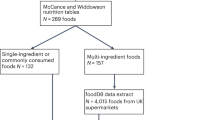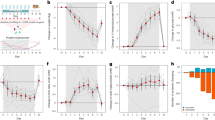Abstract
OBJECTIVE: To examine the associations of diet and other lifestyle factors with body mass index (BMI) using data from the Oxford Vegetarian Study.
SUBJECTS: 1914 male and 3378 female non-smokers aged 20–89 y at recruitment to the study.
MEASUREMENTS: All subjects completed a diet/lifestyle questionnaire at recruitment giving details of their usual diet and other characteristics including height and weight, smoking and drinking habits, amount of exercise, occupation and reproductive history. Answers to the food frequency questionnaire were used to classify subjects as either meat eaters or non-meat eaters, and to estimate intakes of animal fat and dietary fibre. Subjects were further classified according to their alcohol consumption, exercise level, social class, past smoking habits and parity.
RESULTS: Mean BMI was lower in non-meat eaters than in meat eaters in all age groups for both men and women. Overall age-adjusted mean BMIs in kg/m2 were 23.18 and 22.05 for male meat eaters and non-meat eaters respectively (P<0.0001) and 22.32 and 21.32 for female meat eaters and non-meat eaters respectively (P<0.0001). In addition to meat consumption, dietary fibre intake, animal fat intake, social class and past smoking were all independently associated with BMI in both men and women; alcohol consumption was independently associated with BMI in men, and parity was independently associated with BMI in women. After adjusting for these factors, the differences in mean BMI between meat eaters and non-meat eaters were reduced by 36% in men and 31% in women.
CONCLUSIONS: Non-meat eaters are thinner than meat eaters. This may be partly due to a higher intake of dietary fibre, a lower intake of animal fat, and only in men a lower intake of alcohol.
This is a preview of subscription content, access via your institution
Access options
Subscribe to this journal
Receive 12 print issues and online access
$259.00 per year
only $21.58 per issue
Buy this article
- Purchase on Springer Link
- Instant access to full article PDF
Prices may be subject to local taxes which are calculated during checkout
Similar content being viewed by others
Author information
Authors and Affiliations
Rights and permissions
About this article
Cite this article
Appleby, P., Thorogood, M., Mann, J. et al. Low body mass index in non-meat eaters: the possible roles of animal fat, dietary fibre and alcohol. Int J Obes 22, 454–460 (1998). https://doi.org/10.1038/sj.ijo.0800607
Received:
Revised:
Accepted:
Published:
Issue Date:
DOI: https://doi.org/10.1038/sj.ijo.0800607
Keywords
This article is cited by
-
Meat consumption and the risk of general and central obesity: the Shahedieh study
BMC Research Notes (2022)
-
Associations between plant-based dietary indices and dietary acid load with cardiovascular risk factors among diabetic patients
International Journal of Diabetes in Developing Countries (2021)
-
Association of white and red meat consumption with general and abdominal obesity: a cross-sectional study among a population of Iranian military families in 2016
Eating and Weight Disorders - Studies on Anorexia, Bulimia and Obesity (2017)
-
Type of vegetarian diet, obesity and diabetes in adult Indian population
Nutrition Journal (2014)
-
Health aspects, nutrition and physical characteristics in matched samples of institutionalized vegetarian and non-vegetarian elderly (> 65yrs)
Nutrition & Metabolism (2011)



